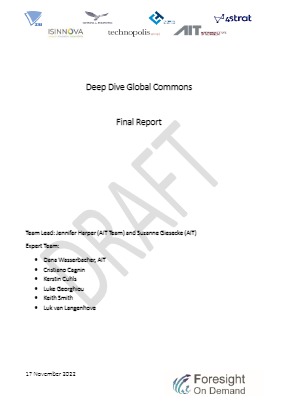The concept of the global commons refers to resource domains that fall outside national jurisdiction, to which all have access, including high seas, airspace, outer space, and cyberspace. Given the growing significance of these domains and related resources for states and other global and local players across a range of purposes, defining the concept of the global commons has become more complex. The Global Commons Alliance network of concerned organisations refers to two definitions of the concept.
The first is based on geopolitics, where the global commons are areas whose potential economic resources lie beyond national jurisdiction: the atmosphere, the high seas, Antarctica, and outer space. The second definition has its roots more in economics and how shared resources can be overused by some at the expense of others, regardless of national jurisdiction. The strategic access and use of resource domains for military/commercial purposes put pressure on their status. Recent geopolitical developments highlight the need for exploring appropriate forms of global governance or stewardship to ensure responsible (sustainable) management to benefit present and future generations.
This deep dive aims to address the following questions:
- What constitutes a global commons? How do global commons differ? How is the concept of global commons likely to evolve up to 2040? Adapting a taxonomy of global commons for the emerging geopolitical, environmental, and economic context.
- What are the main emerging disruptors of global commons up to 2040? What could change and upset established global commons regimes? How can laws be introduced and implemented in emerging global commons? The emphasis is on geopolitics and how legal frameworks can survive technological change. How can innovation reinforce the commons?
- How is the economics of common property evolving (from Hardin's very influential work to the massive critique of Hardin by Elinor Ostrom)? linking to major policy debates such as privatisation. Can Ostrom’s approach be scaled up to the level of states? and extended to the common property of the atmosphere or oceans? What would be necessary for such a large-scale negotiation process?
- How can we govern the commons as a different type of ownership? The emergence of global commons-orientation in innovation? In particular mission-oriented innovation. Exploring the rights and personality of ecosystems and other entities as right holders. Ecological services as transversal.
- How can we make the global commons work? - the need for cooperative behaviour if global commons and sustainability are to be achieved. Multilateralism 2.0. and emerging role of science diplomacy up to 2040. Ukraine war as an epochal war: the dangers of the war (state of permanent cold war) for acting seriously on the global commons. Potential split with China and new hegemonies in Africa (e.g Belt and Road debt).
The aim is to identify cross impacts of the global commons areas and key drivers.



